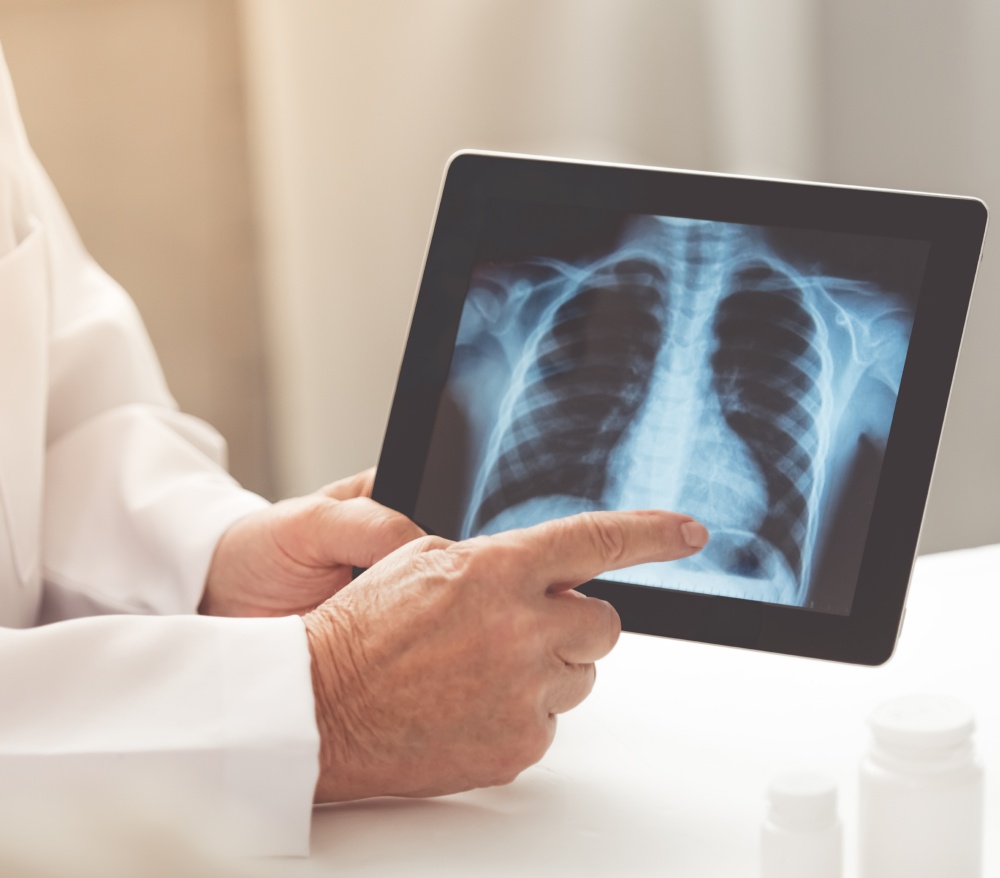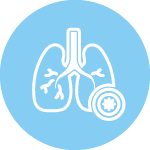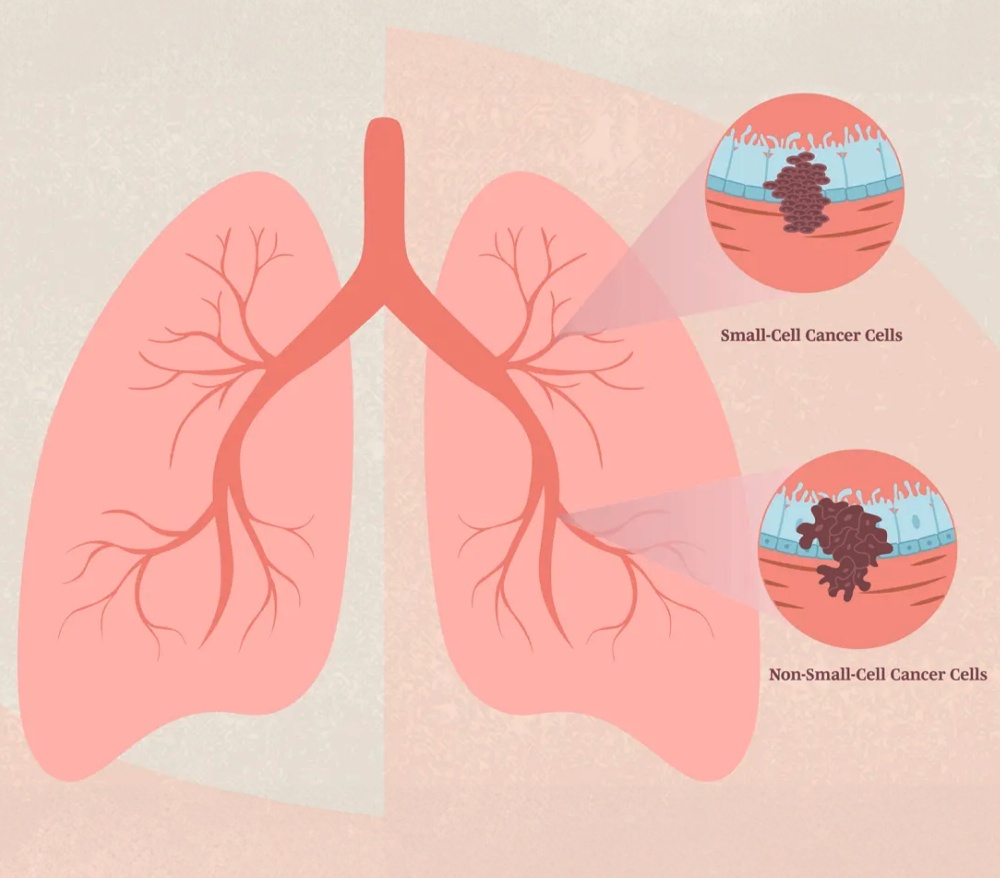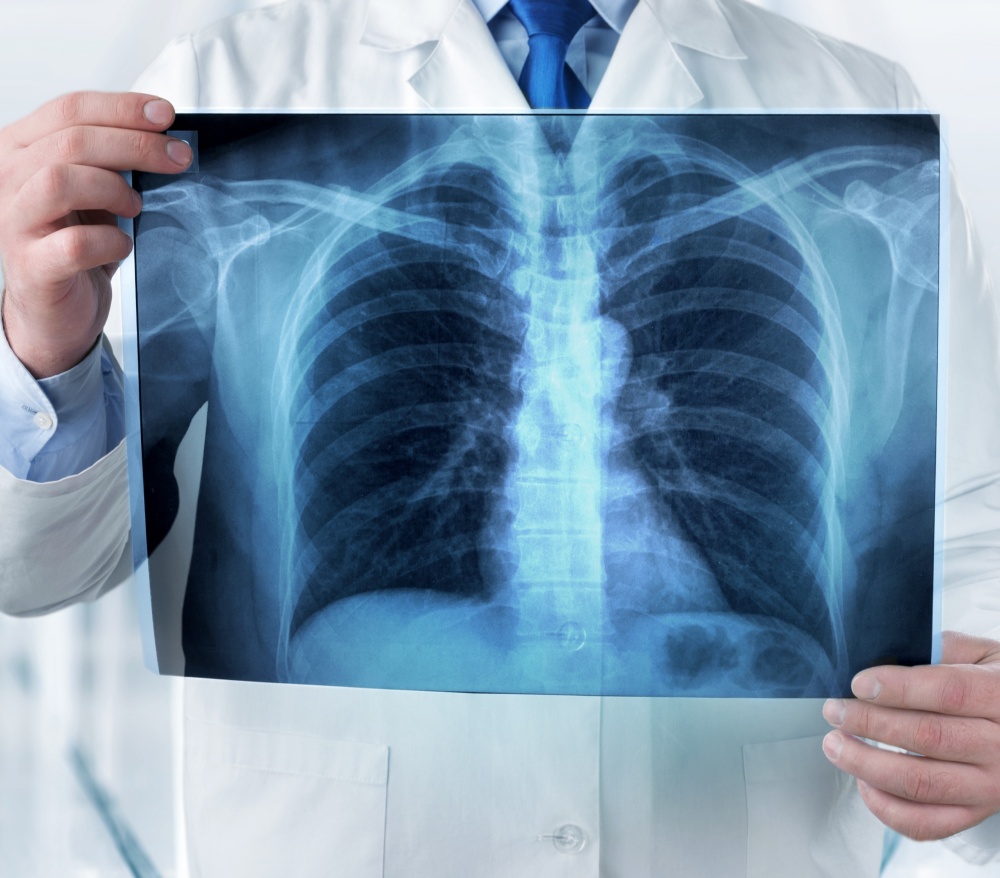Lung Cancer Treatment in India
Lung Cancer Treatment at Thangam Hospital, Tamil Nadu
Lung Cancer Treatment Options in India
Early Stage Lung Cancer Treatment in India
Surgical Lung Cancer Treatment in Tamil Nadu, India
Chemotherapy for Lung Cancer Treatment
Targeted Therapy for Lung Cancer Treatment in India
Lung Cancer Diagnosis and Personalised Treatment Plan in Tamil Nadu
Immunotherapy for Lung Cancer Treatment in India
Lung Cancer

What is Lung Cancer?
Lung cancer begins when cells in the lungs grow uncontrollably, forming tumors that interfere with the normal breathing process. It typically arises in the lining of the bronchi, bronchioles, or alveoli—parts of the respiratory system responsible for air exchange.
Lung cancer is one of the leading causes of cancer-related deaths in India and across Asia. While smoking is a major risk factor, lung cancer can also develop in non-smokers. Early detection and specialized treatment play a vital role in improving outcomes.
Causes and Risk Factors of Lung Cancer
Several factors increase the risk of lung cancer:
Smoking
The top risk factor, contributing to over 80% of cases.
Passive smoking
Second-hand smoke exposure at home, work, or public places.
Genetic predisposition
Family history and inherited DNA mutations.
Age
Risk increases with age.
Past lung diseases
TB, bronchitis, and other infections can leave scarring.
Exposure to carcinogens
Includes radon gas, asbestos, air pollution, and arsenic in water.
Radiation exposure
Especially previous radiation therapy to the chest.
Poor diet and lifestyle
Lack of proper nutrition and physical activity.

Symptoms of Lung Cancer
Symptoms may vary depending on the type and stage of cancer, and they often overlap with other lung diseases.
Early evaluation is key if you notice any of the following:

Persistent or
worsening cough

Coughing up blood (hemoptysis)

Shortness of breath (dyspnea)

Wheezing or whistling
while breathing

Hoarseness or
voice changes

Frequent infections like bronchitis or pneumonia

Chest, back, or
shoulder pain

Swelling in the face, arms, or lymph nodes

Fatigue or unexplained weight loss

Loss of appetite

Fever not responding to regular treatment

Types of Lung Cancer
Lung cancer is broadly classified into two main categories:
- Non-Small Cell Lung Cancer (NSCLC) – 80–85% of cases includes:
- Adenocarcinoma: Begins in mucus-secreting glands. Common in non-smokers too.
- Squamous Cell Carcinoma: Originates in the central bronchi, often linked to smoking.
- Large Cell Carcinoma: Aggressive and fast-spreading. Includes subtypes like:
- Neuroendocrine carcinoma
- Adenosquamous carcinoma
- Sarcomatoid carcinoma
- Small Cell Lung Cancer (SCLC) – 10–15% of cases
A fast-growing cancer often diagnosed after it has spread. Responds well to chemotherapy and radiation but has a high recurrence rate.
Diagnostic Tests for Lung Cancer
Thangam Hospital offers a full range of advanced diagnostics for lung cancer evaluation:
- Physical Examination & History
- Chest X-Ray (PA & lateral views)
- CT Scan Chest, abdomen, and brain
- MRI To check for metastasis, especially in the brain
- PET-CT Scan Assesses spread and staging
- Bronchoscopy & EBUS For airway visualization and biopsy
- Sputum Cytology Microscopic analysis of coughed-up mucus
- Lung Biopsy Confirms cancer type and staging
- Molecular Testing Detects mutations (e.g., EGFR, ALK, PIK3) for targeted therapy
- Blood Tests Evaluate organ function and metabolic markers


Preventing Lung Cancer
While not all types of lung cancer are preventable, you can significantly reduce your risk by:
- Quitting smoking and avoiding tobacco products
- Avoiding exposure to second-hand smoke
- Eating a nutritious diet rich in antioxidants
- Staying physically active and doing breathing exercises
- Testing your home for radon and avoiding occupational hazards
Lung cancer is a life-threatening condition, but with early diagnosis, cutting-edge diagnostics, and personalized treatment at Thangam Hospital, patients have a fighting chance at recovery. If you or a loved one show signs of lung cancer, don’t delay—consult our Thoracic Oncology experts today.
Staging of Lung Cancer
Lung cancer staging is essential for planning treatment. Staging is based on tumor size, lymph node involvement, and metastasis. Tests like PET-CT, EBUS, brain MRI, and biopsy guide the staging process.

Treatment Options for Lung Cancer
Thangam Cancer Center offers Comprehensive Thoracic Oncology Care with a multidisciplinary team including oncologists, pulmonologists, thoracic surgeons, radiologists, and palliative care specialists.
- Lobectomy or segmental removal of affected lung tissue
- Lymph node dissection improves survival chances
- Neoadjuvant: Before surgery to shrink the tumor
- Adjuvant: Post-surgery to remove residual cancer
- Palliative: Advanced stages to relieve symptoms
- Used during neoadjuvant, adjuvant, or definitive phases
- Effective in managing pain from bone metastases
- Personalized medicine targeting specific genetic mutations (e.g., EGFR, ALK)
- Minimizes damage to healthy cells
- Boosts the body’s immune system to attack cancer
- Especially promising in advanced non-small cell lung cancer
Our Oncologists
FAQs - Lung cancer treatment
What are the common treatment options for lung cancer?
Lung cancer treatment options include surgery, chemotherapy, radiation therapy, targeted therapy, and immunotherapy. The choice depends on the cancer type (non-small cell or small cell) and stage. At Thangam Cancer Center, our cancer specialists design personalized treatment plans combining these therapies for the best outcomes.
How is lung cancer diagnosed and staged before treatment?
Lung cancer is diagnosed using imaging tests such as CT, MRI, and PET scans, followed by a biopsy to confirm the presence of cancer cells. Staging is done through the TNM system – assessing the size of the tumor (T), spread to lymph nodes (N), and metastasis to other organs (M). At Thangam Cancer Center, these results help doctors create a personalized treatment plan tailored to each patient’s condition.
What is the best treatment for lung cancer in India?
The best lung cancer treatment in India depends on the stage and type of the disease. Early-stage cancers may be treated with surgery and radiation, while advanced stages often require chemotherapy, targeted therapy, or immunotherapy. Thangam Cancer Center offers advanced, affordable, and evidence-based treatment under expert oncologists.
Can lung cancer be cured completely in India?
Yes, lung cancer can be cured if detected early and treated promptly. Early-stage tumors that haven’t spread can often be removed surgically. At Thangam Cancer Center, early detection, modern diagnostic tools and personalized therapy, including robotic surgeries, deliver better clinical outcomes.
What are the side effects of lung cancer treatment?
Common side effects include fatigue, nausea, hair loss, breathing difficulty, and low immunity. These vary by treatment type. At Thangam Cancer Center, patients receive supportive care, nutrition counseling and symptom management to reduce side effects and maintain quality of life, like scalp cooling is offered to reduce hair loss from treatment.
How long does lung cancer treatment usually take?
The duration of lung cancer treatment depends on the type and stage of the disease. Typically, chemotherapy lasts 3 to 6 months with 4 to 6 treatment cycles. Radiation therapy may continue for up to 6–7 weeks, while immunotherapy is often given every 2 to 6 weeks for one to two years. Targeted therapies are often taken daily for several years. At Thangam Cancer Center, doctors tailor each treatment plan and timeline to the patient’s specific diagnosis and recovery goals.
Is surgery necessary for all lung cancer patients?
No, not all patients require surgery. The decision depends on the type, stage, and location of the cancer, as well as the patient’s overall health. Surgery is typically advised for early-stage lung cancer, while advanced cases may benefit more from chemotherapy, radiation, or targeted therapy. At Thangam Cancer Center, the oncology team decides the best approach based on individual diagnosis.
Does Thangam Cancer Center offer advanced treatments like targeted therapy or immunotherapy for lung cancer?
Yes. Thangam Cancer Center provides cutting-edge treatments like targeted therapy and immunotherapy that attack cancer cells precisely while minimizing damage to healthy tissues. These therapies have improved survival rates for advanced and metastatic lung cancers.
What is the recovery process after lung cancer treatment?
Recovery after lung cancer treatment involves regular follow-ups, pulmonary rehabilitation, a healthy lifestyle and emotional support. At Thangam Cancer Center, patients receive continuous post-treatment support, including counseling, nutrition guidance and exercise programs to regain strength and prevent recurrence.
How can I consult a lung cancer specialist at Thangam Cancer Center?
You can consult a lung cancer specialist at Thangam Cancer Center by booking an appointment online or contacting the hospital directly. Our oncology team ensures prompt evaluation, accurate diagnosis, and personalized treatment planning for every patient.




